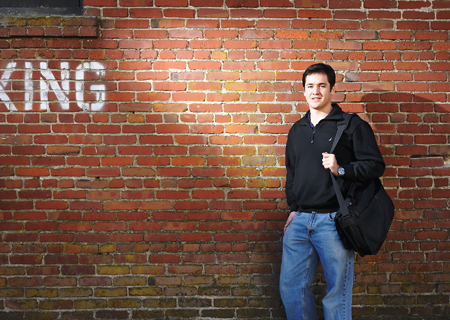Chris Hulls doesn’t want you to panic.
But if you should, the 25-year-old Point Reyes native has developed an innovative new panic button that is just one piece of a complete system, called Life360, designed to help families and communities stay connected in emergencies.
“What if you lose your cell phone; what if your kid misses curfew?” Hulls asks. “We are the first site on the web to solve all of life’s what-ifs… it’s a killer app for Main Street.”
Late last year Google agreed, awarding Hulls $270,000 to work on Life360. His new company finished in the top 10 of more than 1,700 contestants in the Google Android Developer Challenge, a bid for innovators to create mobile applications for Android, Google’s new open-standards platform for mobile devices.
“We are a good display for what Android can do,” says Hulls. “This is stuff that can’t be done on an iPhone.”
Unlike iPhone applications, Life360 has the ability to run in the background so it is always ready to respond in an emergency. The Life360 technology—which will have a web and mobile phone interface as well as some other decidedly low-tech features such as coded cell phone stickers and wallet-size identification cards—does everything from asking a family member to check on Grandma to facilitating the return of a lost cell phone. Life360 should also work if most major infrastructure is down.
“We get pushback for being so broad in our focus, but I think if we can pull it off it will be great,” says Hulls, a UC Berkeley graduate who runs his company out of the basement of Berkeley’s Bancroft Hotel, home to several other start-ups incubated in a university-affiliated entrepreneur program. “Our competition is making [separate] companies out of what should just be features.”
College of Marin accounting and economics teacher Robert Kennedy recognized Hulls’s potential back when Hulls was a student on the Kentfield campus. “He was a quiet boy, but every time he answered a question it was so right on,” says Kennedy, a San Anselmo resident who later became a mentor to Hulls. “He just stood out, crystal clear.”
Eventually Kennedy let Hulls take over his basement to get the company launched. “Initially it was just an idea,” Kennedy says. “He had no money, no connections; I didn’t think he could do it. But Hulls is tenacious and willing to ask for help, and I saw his idea morph…Now I think he has a great product and he seems to know everybody [in the business community].”
Harvard University also sees a lot of promise in Hulls, granting him a deferment from MBA studies to develop the company that started as little more than a school project.
“For a year I did everything wrong,” Hulls recalls of the effort to launch. “I was a business guy doing a tech product.” Today he employs eight full-time staff and four part-timers. “It is scary to have full-time employees, but it is time to launch. It is either up or out.”
Look for Hulls to make good on his promise with limited launches of portions of Life360 this spring. To eyeball the sort of technology he’s working on, download the just-released Panic & Poke application for the iPhone or visit life360.com.


